Friday, December 01, 2006
Kerala Backwaters
| Previous | First post | Next |
A large part of coastal Kerala is below sea level. At some point it will undoubtedly be taken by the sea. Meanwhile, the backwaters are worth a visit. They consist of very wide and very narrow canals and big lakes. Many people who go to the backwaters will spend one or more days on a house boat.
 The boat will travel around the backwaters but tends to avoid the most interesting parts: the narrow canals. We could easily have arranged a backwater trip through GK Homestay, but we decided against it. Not only is it pricey, anywhere between Rs. 10,000 and 20,000 a day, but Mort isn't really like a fish in water; more precisely, he is a notorious worrier and generally quite unlucky so it would have been unnecessarily stressful and risky to spend too much time (and asleep!) on a boat. Also, according to George you will probably experience enough of the backwaters by doing a 4 hour round trip on the local ferry for Rs. 14.
The boat will travel around the backwaters but tends to avoid the most interesting parts: the narrow canals. We could easily have arranged a backwater trip through GK Homestay, but we decided against it. Not only is it pricey, anywhere between Rs. 10,000 and 20,000 a day, but Mort isn't really like a fish in water; more precisely, he is a notorious worrier and generally quite unlucky so it would have been unnecessarily stressful and risky to spend too much time (and asleep!) on a boat. Also, according to George you will probably experience enough of the backwaters by doing a 4 hour round trip on the local ferry for Rs. 14.So, we did a half hour walk from the house to the boat jetty, i.e. a small piece of concrete on a random water road. The walk, at 8 am, took us past numerous houses and people preparing for the day ahead. We even walked past Dai's farther, who also lives in the house, on his way back from his morning walk. He is an amazingly fit 85 year old. He is growing old the right way. We did wonder why there didn't seem to be much acknowledgement between George and the dad in law, but apparently Keralans don't use very explicit greetings; a small movement of some part of the face is enough to greet another person. Many tourists learn the good day greeting “nameste” before going to Kerala, but a Keralan would actually never use this word; presumably one of the most useless words in the Keralan dictionary.
As we walked, George entered into conversation, whilst walking, with people standing in front of their houses. The typical question would be, in Malayalam, “where are you going?”, and, he told us later, “tell the foreigners to give us some money”. The general perception in Kerala is that all foreigners are rich, which may be true by Indian standards, but they seem to forget that these tourists may not be quite as rich in their home countries. Once, when he tried to get some washing done for some guests, and asked for a price, the washer wallah told him to charge Rs. 1,000 from the guests. This obviously was an outrageous demand, unless it was 50 items needing washing, and from that day he decided to limit the amount of outside help in running the homestay.
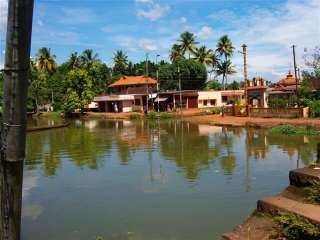 The ferry ride itself was very nice; we saw sunbathing birds, the local fishermen in action, posh houses being build next to the water, waiting to be flooded, and a large number of canoes travelling up and down the stream. There is even a school canoe which picks the pupils up in the morning and delivers them back home safely in the afternoon.
The ferry ride itself was very nice; we saw sunbathing birds, the local fishermen in action, posh houses being build next to the water, waiting to be flooded, and a large number of canoes travelling up and down the stream. There is even a school canoe which picks the pupils up in the morning and delivers them back home safely in the afternoon.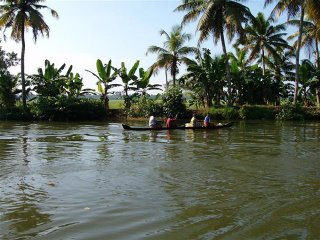 One third of the way through the trip George got off the boat to pick up four Irish women who had stayed overnight in a house boat, and we were left to our own devices. We were sitting at the front of the ferry when the usual topic of “health and safety regulations” came up. In this particular ferry it is not recommended to get up too quickly; if you do, it could result in an instant penetration of the skull. Hopefully, the little bit of red at the end of the screw is just rust.
One third of the way through the trip George got off the boat to pick up four Irish women who had stayed overnight in a house boat, and we were left to our own devices. We were sitting at the front of the ferry when the usual topic of “health and safety regulations” came up. In this particular ferry it is not recommended to get up too quickly; if you do, it could result in an instant penetration of the skull. Hopefully, the little bit of red at the end of the screw is just rust.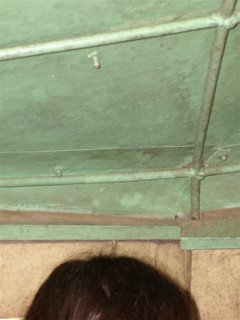 The ferry reached its end station and we had about an hour before we had to go back the same way we came on the same ferry. The village we had arrived at, we never got the name, was a nice little place; one of its locations was the “School for the Mentally Retarded”. The term “disabled” still hasn't been introduced to Indian English. We had a nice little walk, Mort peed onto a wall Indian style, and we found a deserted junction where traffic, the term “traffic” used in the loosest possible sense, was being directed by a female traffic police officer.
The ferry reached its end station and we had about an hour before we had to go back the same way we came on the same ferry. The village we had arrived at, we never got the name, was a nice little place; one of its locations was the “School for the Mentally Retarded”. The term “disabled” still hasn't been introduced to Indian English. We had a nice little walk, Mort peed onto a wall Indian style, and we found a deserted junction where traffic, the term “traffic” used in the loosest possible sense, was being directed by a female traffic police officer.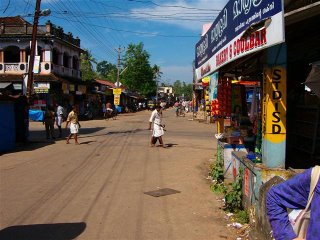 When we returned to the boat jetty we got back on to our dilapidated ferry, to the left in the photo below. We were the only passengers on our ferry whereas the other, posher ferry, was completely full. Apparently, it was the ferry to Allepey, another backwater town, which has lots of stale water and mosquitoes carrying Chikungunja; a very good reason to stay in Kottayam rather than Allepey if you want to experience the backwaters.
When we returned to the boat jetty we got back on to our dilapidated ferry, to the left in the photo below. We were the only passengers on our ferry whereas the other, posher ferry, was completely full. Apparently, it was the ferry to Allepey, another backwater town, which has lots of stale water and mosquitoes carrying Chikungunja; a very good reason to stay in Kottayam rather than Allepey if you want to experience the backwaters.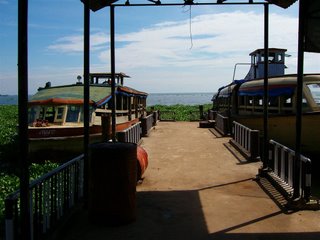 After four days of relaxation it was time to leave Kottayam and go on our first train journey.
After four days of relaxation it was time to leave Kottayam and go on our first train journey. | Back to top | Previous | First post | Next |


leave a response